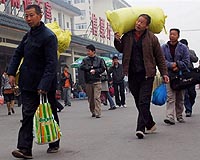 |
Beijing (AFP) June 17, 2009 China has launched a sweeping crackdown on graft in the boom city of Shenzhen, just north of Hong Kong, seeking to rein in unruly officials and soothe public anger over high-level vice, analysts said. The campaign, which has already cost the city mayor his job, comes just three years after an anti-corruption drive led to a trail of top officials and businessmen being jailed in the financial centre Shanghai in a similar case. "It is a large-scale anti-corruption case in a province at the forefront of reforms, where there is large money," said Willy Lam, an expert on Chinese politics at the Jamestown Foundation, a US think tank. "It is not surprising there is corruption there, and a high degree of collusion between politics and business." President Hu Jintao has repeatedly insisted that fighting corruption is a question of "life and death" for the ruling Communist Party, and the fact that the battle is now taken to Shenzhen only raises the stakes. Just a fishing village a generation ago, Shenzhen, in bustling Guangdong province, is now a city of 11 million people. Its hypermodern skyline is seen as testimony to the achievements of China's market experiments, but to many the emerging corruption case reflects the dark side of reform. Shenzhen mayor Xu Zongheng, 53, was placed under internal Communist Party investigation earlier this month for "serious violations of discipline," state media reported. Such charges often result in graft convictions in China's judicial system, which is overseen by the ruling party. It may have especially triggered Beijing's ire that Xu reportedly bought his way to power, challenging the party's monopoly on appointments. "It's very important for the party to ensure subordination and discipline among officials," said Joseph Cheng, a China watcher at City University of Hong Kong. According to media reports, Xu is also being probed for links to Huang Guangyu, formerly China's second-richest man and the founder of Gome Electrical Appliances, one of the nation's largest home retailers. Huang was arrested earlier this year on suspicion of financial crimes, including manipulation of the stock market. Xu's wife as well as a vice mayor, a former assistant minister of police, and a leading Guangdong politician may also be under investigation for alleged links to Huang, local media have said. Some have pointed to echoes of the case surrounding Chen Liangyu, Shanghai's former top party official, who was placed under investigation for graft in 2006 in a probe that led to the downfall of up to 20 top officials and businessmen. Chen's case centred around the misappropriation of billions of dollars from a Shanghai pension fund that ended up in speculative real estate and infrastructure deals. Chen, convicted of accepting bribes and abusing his power, was sentenced to 18 years in prison in April 2008, becoming the highest Communist Party leader to be jailed for graft since 1995. "There is a bit of an impression that after Shanghai comes Guangdong," said Jean-Philippe Beja, a Hong Kong-based China scholar with the French National Centre for Scientific Research and a prolific writer on Chinese politics. The upcoming 60th anniversary of the communist state is an additional occasion for the leadership to worry about what upsets people, and few issues are as consistent a source of discontent as corruption. Adding to the government's imperative to act, this year has also seen the 20th anniversary of the Tiananmen protests. "We are passing through some nasty anniversaries, where fighting corruption was a relatively important issue," said Beja. Meanwhile, Lam said the crackdown was unlikely to expand much further. "The campaign is coming to an end: morale is very low in Guangdong, officials are afraid and need to be reassured," Lam said. The Huang Guangyu case is "too big, too many people have been implicated in different ministries and provinces... so they have decided not to go after so many people." Share This Article With Planet Earth
Related Links China News from SinoDaily.com
 China warns labour, business disputes add to instability
China warns labour, business disputes add to instabilityBeijing (AFP) June 16, 2009 China's top law official has warned social stability is under increasing threat from labour and business disputes in the midst of the global crisis, according to remarks published Tuesday. Senior Communist Party leader Zhou Yongkang said that in this situation China's security forces need to step up their efforts to quell unrest and protect people's lives and property. "We must clearly ... read more |
|
| The content herein, unless otherwise known to be public domain, are Copyright 1995-2009 - SpaceDaily. AFP and UPI Wire Stories are copyright Agence France-Presse and United Press International. ESA Portal Reports are copyright European Space Agency. All NASA sourced material is public domain. Additional copyrights may apply in whole or part to other bona fide parties. Advertising does not imply endorsement,agreement or approval of any opinions, statements or information provided by SpaceDaily on any Web page published or hosted by SpaceDaily. Privacy Statement |